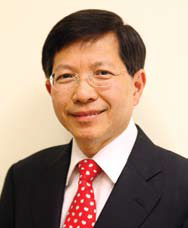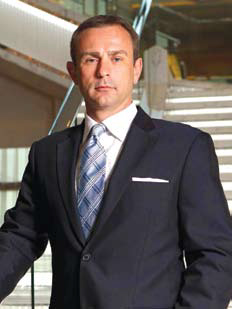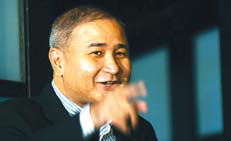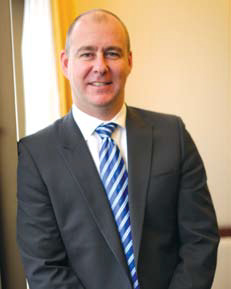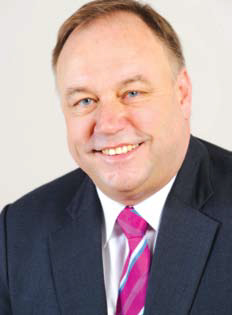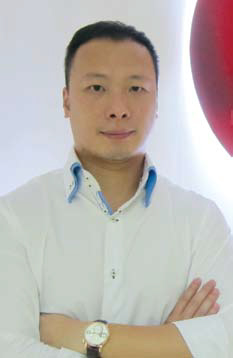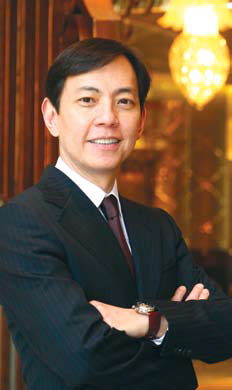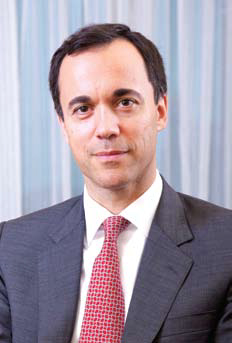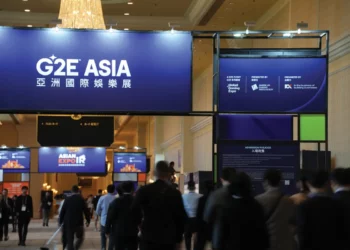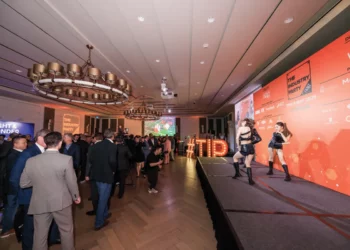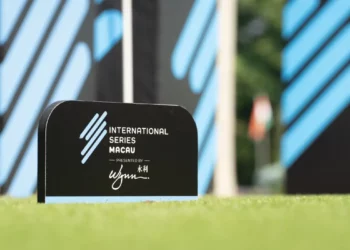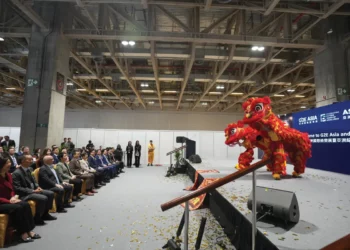21 Tan Hee Teck
President and COO
Resorts World Sentosa
Singapore’s Resorts World Sentosa is the jewel in the crown of Genting’s global operations. It comprises half of a government-mandated duopoly in what is arguably the most profitable gaming market in the world.
Tan Hee Teck stands at the helm of that operation and was instrumental in helping Genting score the license to operate the casino in 2006. Since then, he has helped Genting maintain its strong position in the market.
It has not all been smooth sailing, however. Genting Singapore reported a net profit of S$165.5 million in the quarter ended 30th June, a year-on-year decline of 32%. The company blamed the global economic downturn and noted that a decline in casino business volumes, especially in the premium-player segment, weighed heavily on earnings.
But non-gaming business performed well. Hotel occupancy and average room rates in the second quarter hit all-time highs of 92% and S$432, respectively, indicating that interest in the city-state as a tourist destination remains strong, and Sentosa’s slice of that pie will grow as an expansion project under way at the property reaches completion by the end of the year.
Speaking of Mr Tan’s accomplishments, one Singapore gaming analyst says, “They’re fairly limited on what they can build because the government restricts them, but I think he’s done a good job.”
The ongoing success of Sentosa will also depend on the dictates of Singapore’s Casino Regulatory Authority, which is mulling the imposition of stricter rules to prevent locals from succumbing to problem gambling.
It appears, however, that under Mr Tan’s watch, RWS has developed a solid foundation to weather whatever economic and regulatory headwinds blow its way.
22 Gabriel Hunterton
Chief Operating Officer
StarWorld Hotel and Casino
Though Galaxy Entertainment Group’s new flagship, Galaxy Macau, clearly made the largest contribution to the company’s stellar first-half results, the continued robust performance of its erstwhile flagship since 2006, StarWorld Hotel and Casino, perhaps stands out more. Although the property is disadvantaged by a modest plot size—relative to its neighbors, including Wynn Macau and MGM Macau—that limits the range of amenities it can offer, its steadfast commitment to offering high rollers convenience and exemplary service has allowed it to achieve one of the largest rolling chip volumes in the VIP segment.
StarWorld punches well above its weight, earning disproportionately large VIP baccarat revenue relative to its size and development cost—HK$3.4 billion (US$436 million). Gabe Hunterton was appointed to head StarWorld in December 2009, with a remit to “develop and refine” the property’s performance, and to prepare it for the impact of the opening of the far-better appointed US$1.9 billion Galaxy Macau on Cotai and the inevitable migration of some of StarWorld’s players there.
Galaxy Macau was unveiled in May 2011, and it’s a credit to Mr Hunterton that StarWorld hasn’t missed a beat since then, recently achieving its 16th consecutive quarter of record EBITDA. Adjusted property EBITDA was up 30% to $1.8 billion in the first half of 2012. StarWorld’s VIP rolling chip volume of HK$339 billion and revenue of $9.9 billion in the period was just a shade off Galaxy Macau’s volume of $358 billion and revenue of $11.4 billion.
StarWorld was never intended to be a mass-market property, owing to the limitations placed on its main gaming floor by the property’s plot size. Still, the property’s mass gaming revenue in the first half of 2012 surged 52% year on year to HK$1.1billion, with the regular shuttle bus service linking StarWorld to Galaxy Macau credited with driving increased visitation.
Still, StarWorld remains very much focused on its VIP business, and in Macau that is strongly based on personal relationships. Like a healthy marriage, those relationships with the players, and also the junket investors, junket consolidators, agents and sub-agents that bring in the high rollers from mainland China and beyond, need to be nurtured and affirmed on virtually a daily basis. The consensus is Mr Hunterton, backed by one of the best business development teams in the industry, has done a first-rate job on that front.
Mr Hunterton quickly proved he had the necessary people skills and managerial experience to fit into GEG’s corporate culture and to keep the marriage between StarWorld and its players and junkets a happy one. If you speak to executives from the junkets, they consistently single out GEG for praise in terms of its support and fairness toward the trade. Not all the Macau operators have been as consistent in their approach to managing their relationships with the junkets as Mr Hunterton, his colleagues and his employers.
He also does a good job leading by example and instilling the group’s commitment to treating its customers better than its rivals do in all of StarWorld’s employees. “It’s our service that makes StarWorld Macau stand out in this competitive market, and the most important part of our service delivery is definitely our team members,” he says.
Mr Hunterton is a 15-year veteran of the gaming industry in Las Vegas and Macau. Prior to joining GEG he spent three years in senior operational and business development leadership roles with MGM Grand Macau.
After graduating from Yale University with a degree in economics, Mr Hunterton began his gaming career as a dealer at Treasure Island in Las Vegas. He quickly advanced to the position of director of slot operations at the neighboring Mirage and then progressed to a national marketing director role at Bellagio.
23 Cristino Naguiat
Chairman and CEO
Philippines Amusement and Gaming Corporation
Cristino Naguiat took over the Philippines Amusement and Gaming Corporation two years ago in the midst of one of the most troubled periods in the troubled history of he lucrative government-run operator and regulator and by all objective measures he’s performed admirably, restoring operational and administrative stability in the wake of a massive corruption scandal and seeing the first shovels finally hit the ground at the country’s long-awaited Entertainment City resort complex in Manila.
In 2011, his first full year in office, PAGCOR’s total revenues were up 16.5%, the overwhelming majority of it generated by its 13 Casino Filipino-branded venues (the agency also franchises bingo and poker outlets and licenses a significant e-gaming industry)
In May 2012, the most recent month for which official results are available, the corporation’s gross income rose 22% year on year to P3.71 billion (US$87 million), 64% of it from operations. It was the highest total ever for the month of May—the 11th record month, in fact, under Mr Naguiat’s administration—and it was achieved in the teeth of competition from a significant private sector, led by Resorts World Manila, the highest-grossing casino in the Philippines, and increasing competition across East and Southeast Asia. PAGCOR’s total revenues are up 23% through the first five months of the year, leading the agency to confidently forecast P44 billion in total revenue when 2012 is said and done (US$1 billion), a 20% increase year on year if it’s achieved—and 70% of it, the company says, will come from gaming operations.
More important for the longer term is the positive impact this is having on PAGCOR’s relationship with the government, for which the corporation is the third-largest source of revenue after the bureaus of Internal Revenue and Customs. No doubt it has strengthened Mr Naguiat’s voice in the councils of President Benigno Aquino, who appointed him in July 2010 and whose office directly oversees the agency, and this makes it likely that his influence on the most pressing issues facing the agency, and the future of gaming in the Philippines, will be considerable.
Topping the list is the increasing pressure PAGCOR faces to relinquish its operations, divest itself of the Casino Filipino franchise, and concentrate on its role as regulator. Pro-Aquino lawmakers are pushing just such a bill, and it has support, many seeing privatization as a necessity given the dramatic expansion that is on the way in the form of the US$5 billion Entertainment City project.
Mr Naguiat has his hands full, too, with cleaning up PAGCOR’s image and ensuring foreigners that Philippines gaming is a safe investment, a daunting task in a country that last year ranked 129th out of 180 in Transparency International’s “Corruptions Perception Index”—tied with Armenia and the Dominican Republic and behind states like Bolivia, Mozambique and Kazakhstan. It was only in recent weeks that lawmakers introduced a bill to finally include casinos in the country’s anti-money-laundering regulations.
The regime of his predecessor, Ephraim Genuino, hasn’t made things easy. The former chairman faces a raft of corruption charges as part of an investigation implicating dozens of former PAGCOR officials. It’s claimed that millions of dollars in public funds were misused or have gone missing. Shady dealing at the property level have been another problem. It was alleged last year that some Casino Filipino managers were working in cahoots with gamblers in a scheme that is believed to have cost the government tens of millions.
24 Yasushi Shigeta
President and CEO
Angel Group
Baccarat is by far the bigges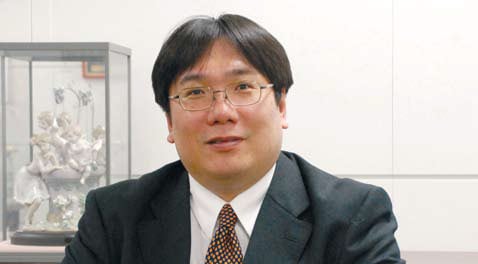 t earner in Macau, the world’s most lucrative casino gaming destination. More recently, it has also been the saving grace of the Las Vegas Strip, where following the onset of the global financial crisis, baccarat has bucked the overall declining trend to become the highest grossing table game, driven by the insatiable appetite of Asian players the world over. Clearly, there is too much at stake to risk the game being compromised by security threats, dealer mistakes or manufacturing errors.
t earner in Macau, the world’s most lucrative casino gaming destination. More recently, it has also been the saving grace of the Las Vegas Strip, where following the onset of the global financial crisis, baccarat has bucked the overall declining trend to become the highest grossing table game, driven by the insatiable appetite of Asian players the world over. Clearly, there is too much at stake to risk the game being compromised by security threats, dealer mistakes or manufacturing errors.
Angel Playing Cards Co has become the world’s biggest supplier of casino playing cards in large part because it is considered best-suited to ensuring the integrity of baccarat. It does this by providing not only playing cards manufactured to its highly exacting standards, but also a revolutionary electronic baccarat shoe, the ANGEL EYE. More than 7,500 ANGEL EYE units have been deployed at casinos worldwide.
Under Yasushi Shigeta’s stewardship, Angel Group has maintained and built on its precious reputation for quality control in the manufacturing of its products. Angel Playing Cards are acknowledged in the Asian gaming industry for having the lowest failure rate of any product in that category. One Macau operator reports that Angel’s pre-shuffled product has an eerrorfree record of over 99.9%. That reliability has translated into sales. Angel is dominant in Macau, where the company is estimated to have 90% of the market. Regionally, Angel says it has an 80% share of the Asian and Australian markets and has risen to become the biggest supplier of playing cards to the global casino industry.
Mr Shigeta’s professional background in management consultancy—he entered the sector after graduating with a degree in information science from Kyoto University in 1990—helped him with overseeing quality-related issues when he joined Angel three years later. He worked his way up from middle management to become a director in 1995, finally being appointed to the top job in 2005.
After assuming the CEO position, Mr Shigeta led the crucially important development of the ANGEL EYE shoe, which has gone on to revolutionize the game of baccarat in three important ways: 1) it has done away with the cheating technique of “card switching”; 2) it has greatly reduced dealer payout mistakes, hence decreasing losses for casinos; and 3) whereas previously game results were recorded on paper, the ANGEL EYE has made it possible to control data management and display game results on an electronic scoreboard.
Small wonder then that the ANGEL EYE was the judges’ overwhelming choice for “Best Table Utility Product” in Inside Asian Gaming’s Supplier Awards – 2012.
25 David Punter
General Manager Asia Pacific
Aristocrat Technologies
For the last four years, David Punter has held a front-row seat on the robust growth of Macau’s machine gaming market, a tale of which Aristocrat Technologies can justly claim much of the authorship.
Since Mr Punter’s arrival in the territory in 2009, no manufacturer has done a better job at padding a lead like Aristocrat and none have been more successful at developing the themes, content and game mechanics that consistently attract and hold the interest of Chinese players. Not surprisingly, the New South Wales-based giant dominates the territory’s slot floors. Aristocrat closed the books on 2011 with an estimated 60% share of Macau’s installed base at the time of 16,000 or so machines, a market that generated US$1.43 billion in revenue and is likely to hit $2 billion in 2012. In some casinos, Aristocrat’s share runs as high as 70%.
“The core thing,” says Mr Punter, “is really good maths, fundamentally good games.”
It’s what he learned coming up with Aristocrat in the massive, intensely competitive club market in and around Sydney, a school unlike any other, as those who know it will tell you. It’s as pure a “locals” market as there is, consisting of some of the most sophisticated product to be found anywhere in the world because it is so completely dependent on high repeat play, with all that implies in terms of cultivating loyalty by identifying what resonates with gamblers, turning that into game brands that fulfill their expectations and continually refining and improving those brands. In essence, it’s what describes the arc of Aristocrat’s success in Macau— “working closely with our customers,” as Mr Punter puts it, “understanding their requirements and trying to drive that back into our product portfolio.”
When Sands Macao opened in 2004 and gave the Chinese their first taste of a Western- style casino model, Aristocrat, thanks largely to its Australian roots, was quick to grasp the potential for a mass market that could evolve into a sizable slots market. Mr Punter was named to fill the newly created role of regional marketing manager, working from Australia to build relationships with key operators and ensuring that the company’s products and marketing mentality were aligned with their needs.
“We localized pretty quickly,” he recalls of the company’s early success in Macau. “We came up and we saw certain games we had that weren’t Chinese, so we made sure we had Chinese there. Some of our competitors came in with a more US-based approach, and we took a more Australian, a more tailored approach.”
The result was critical first-mover advantage. Aristocrat hasn’t looked back since.
In 2007, Mr Punter was promoted to marketing director Asia Pacific and to general manager two years later, the position he occupies today, directing business development across the region, managing strategic relationships with operators, regulators and government agencies and managing a staff of 28 in sales, marketing, service, operations and systems and finance.
It’s been three years in which Aristocrat has not only maintained its edge in Macau but has expanded on it.
It’s a growth story David Punter is still busily writing.
26 Ken Jolly
Vice President – Asia
Shuffle Master
Shuffle Master is deeply engaged in repositioning itself in Asia and globally as a provider of floor-wide “solutions” rather than as a niche supplier, generating not only one-off sales but also recurring revenues. Industry veteran Ken Jolly is an integral part of that mission.
Mr Jolly is widely recognized as one of the most successful sales and marketing specialists in the sector. He has gained that reputation by listening carefully to customer needs and not only fulfilling them but also pointing out how they can make their purchases perform even more profitably.
Mr Jolly was appointed Shuffle Master’s vice president for Asia at the beginning of 2011 at a time of dramatic expansion for the company, highlighted by an aggressive move into the electronic gaming machine sector. Following the 2006 acquisition of Stargames, the company has enjoyed considerable success with its slots, while the Rapid Table Games line proved an instant hit at Marina Bay Sands in Singapore, signaling Shuffle’s rise as an important player in electronic multi-station table games across the region. The Stargames purchase also added to Shuffle’s portfolio the Vegas Star virtual dealer product, long a staple at Australian casinos, which has recently made its way to Macau in its Grand Baccarat version.
Few manufacturers can boast a range of solutions for the casino floor as varied as Shuffle Master’s. Its innovations have impacted nearly every facet of the gambling experience, and in some cases— the automatic card shuffler, the proprietary table game and the progressive side bet all spring to mind—revolutionized it. The new i-Table, a unique blending of the communal excitement of a traditional table with the ease and security of totally automated betting and play, promises to do the same.
Mr Jolly heads up the effort to promote the entire portfolio across Asia, a mission for which he is amply experienced. He has logged more than 33 years in the business. As Aristocrat Technologies’ general manager for Asia Pacific from 2003 to July 2009, he played a key role in establishing the Australian slot giant as the biggest supplier of machine games in the region. He also served as executive vice president and general manager for Australia, Asia, Africa and Europe for Aruze, assisting the company in building up its global presence almost from a standing start.
Last year, Mr Jolly led the Asia launch of Shuffle Master’s versatile Equinox cabinet, which can run either as a slot or multi-terminal station for an electronic game. In the intervening period, he has assembled a strong team of slot sales executives, helping the Equinox achieve rapid regional penetration, with installations in Macau, Singapore, the Philippines, Cambodia, Laos and Malaysia.
The company has also been busy producing strongly Chinese-themed games for Macau and the rest of Asia, building a base for its continued growth into the future.
27 Lam Iao
Founder and CEO
Laxino Technology Ltd
A major factor behind Lam Iao’s decision to establish Macau-based IT solutions company Laxino Technology in 2008 was a desire to enable aspiring local software developers to pursue their vocation in his hometown.
With the company’s roots in the world’s most dynamic gaming market, it was no surprise that Laxino started out with very much a gaming focus, and the company’s gaming revenues remain on a strong growth track. Mr Iao has, however, led Laxino to branch out into a much broader range of activities, and plans to increase nongaming revenues over the next two years primarily through the provision of software services to the government, telecoms and educational sectors.
On the gaming side, Laxino offers full technical support for online gaming operators: software development and customization, hardware setup, infrastructure design and system integration. Last year, the company generated well over US$5 million in revenue as an online software provider. It has captured 25% of the debit market and 15% of the credit market for the online operators that are targeting Asia, and the company sees strong potential to grow those respective shares.
As Mr Iao observes, because most other gaming software development companies active in Asia are based in Europe, Laxino is well-positioned to offer Asian customers more responsive service and support and has a unique sensitivity to local tastes and needs.
But Laxino’s online gaming ambitions extend beyond the region, and the company is currently in the process of gaining GLI/TST certification of all its games—expected to be completed by next year—in its pursuit of expansion in Europe and Central and South America, where the company has already established a customer base.
Also as part of its gaming activities, Laxino distributes slot machines for South Korean manufacturer Hydako as part of a unique arrangement where Laxino also provides content for the games, including graphics and mathematics, as well as obtaining jurisdictional approvals prior to sales. Laxino is notably the only company in Asia that supplies slot manufacturers GLI-approved content and has had strong success distributing Hydako, achieving installations at every major mass-market casino in Macau, as well as making inroads in Indochina, the Caribbean, South America and the United States.
Laxino’s IT Professional Services unit serves a variety of functions, including helping to deploy the games and software from the company’s development teams and providing end-to-end IT services to land-based casinos and non-gaming enterprises. The unit’s most significant current project involves a partnership with Microsoft and Macau telecoms provider CTM on a cloud service, dubbed “Office Anywhere,” intended to empower the development of small- and medium sized enterprises. Laxino has invested US$1 million in the project over the past year, and as the exclusive technical partner in Macau for the next six years providing Microsoft Cloud services, plans to bring the benefits of such services not only to SMEs, but to everyone in Macau.
Mr Iao says Laxino is also looking into getting into the social gaming arena, though he appreciates that the revenue streams from this realm are currently less concrete, and as such, a move into it would be primarily to serve as a complement to the company’s other activities.
In another venture, Laxino is partnering with Microsoft and Samsung in order to offer the Surface 2.0 application for the entertainment and F&B industries.
Mr Iao graduated from the University of Texas with a master’s degree in computer science and mathematics, then went on to work on both the equipment supplier and casino operator sides of the industry, first in the US for slot machine manufacturer Atronic, then returning to Macau to work at Wynn Resorts and MGM Macau.
At Laxino, he has assembled a team of world-class IT professionals with the requisite skills not only to take the business in new directions, but also to nurture aspiring local talent.
28 Sonny Yeung
Chairman
Success Universe Group
Sociedade de Jogos de Macau singled out strong performance at two of its 20 properties (which include three licensed slot halls and 17 casinos) as instrumental in bolstering its growth in 2011. First was the company’s flagship property, Grand Lisboa. Second was Ponte 16 Resort, Macau, one of SJM’s 14 so-called “satellite” casinos.
Ponte 16 is 51% owned by SJM, with the remaining share held by the property’s thirdparty promoter, Success Universe Group. The property got off to a sluggish start following its February 2008 opening but has recorded continuous improvement in its operating results since then. Its recent revenue growth has outpaced that of the overall market, and in 2011 it recorded its first net profit, with adjusted property EBITDA reaching HK$316.8 million for the year, up from $206.6 million in 2010.
One of the distinguishing features of Ponte 16 vis à vis SJM’s other satellite casinos is the throngs of local players it draws to its main casino floor. Whereas in Macau VIP baccarat accounts for almost three-quarters of total gaming revenue, at Ponte 16 its share is closer to 50%, thanks to the property’s strong mass-market appeal.
Ponte 16’s trademark attraction is Asia’s first and only Michael Jackson museum which records the milestones in the King of Pop’s career and displays a collection of more than 40 iconic items related to the artist (including the famous rhinestone- encrusted glove he wore the first time he performed the “moonwalk” on American television). The property’s other major non-gaming draw is its unique location at Macau’s Inner Harbor, within a somewhat dilapidated neighborhood but offering easy access to Macau’s UNESCO World Heritage sites. Part of its remit, in fact, is to revitalize the surrounding area.
Ponte 16 is currently awaiting government approval to commence construction of its third phase, which will feature a waterfront commercial complex with a total floor area of approximately 40,000 square meters. The complex will also include space for the expansion of gaming areas and car parks, with construction expected to be completed by 2014.
Ponte 16 cost only HK$2.4 billion to build (US$310 million at current exchange rates), a modest sum by contemporary Macau standards. Pier 16 – Property Development Ltd, the owner of Ponte 16, announced in April the signing of five-year syndicated loans with 11 financial institutions worth HK$1.9 billion (US$245 million) and RMB400 million (US$63.6 million). In addition to funding the construction of the third phase, the proceeds will be used to refinance existing credit facilities and repay shareholder loans.
Sonny Yeung’s formative gaming industry experience was as a VIP room operator at Stanley Ho’s Casino Lisboa. The relationship forged during that time paid dividends when he was able to broker the investment deal with Dr Ho for Ponte 16. Success Universe has now moved its VIP customers into a room at Ponte 16 with nine tables while outsourcing another two VIP rooms at the property with a combined 18 tables to two other junket operators. Ponte 16 includes a further 81 mass-market tables.
In addition to Ponte 16, Success Universe Group also operates a cruise business, MV Macau Success, and two travel businesses, Travel Success and Jade Travel. By utilizing the sales network of those businesses, the group has boosted occupancy rates at Sofitel Macau at Ponte 16. Partnerships with China focused airlines and tour operators to offer Chinese tourists travel packages also help draw visitors to Ponte 16.
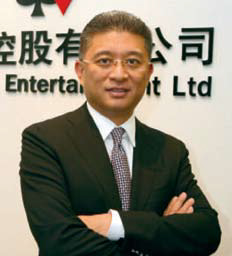
29 Jay Chun
Chairman and Managing Director
Paradise Entertainment
Anyone with a stake in the growth of machine gaming in Macau who hasn’t heard of LT Game will want to remember the name Jay Chun. The electronic table games innovator is chairman and managing director of LT’s parent, Hong Kong-listed Paradise Entertainment, under whose leadership LT has cornered about 8% of the peninsula’s floor space in machine games with more placements to come.
Mr Chun wants LT’s sleek, customizable player terminals to be as numerous in the market as slot machines. That’s a lot of ground to cover, but with more than 1,200 units in operation and counting, the company is moving in the right direction.
At G2E Asia in May, LT unveiled the next generation of its feature-rich Live Table Multi-Game System, with an enhanced software package, greater functionality and some tweaks in the design of the terminals to make them more comfortable and more conducive to extended play.
Baccarat is the most popular offering, not surprisingly, accounting for about 80% of LT’s handle, and as the name of the system implies, the games are live, which makes all the difference in the world as far as Chinese players are concerned. The distinction is so important that Paradise has obtained a patent on the technology in Macau, and Mr Chun is relentless in seeing that it’s enforced. He’s had more than one prospective competitor ridden out of town, and he’s gone toe-to-toe with Las Vegas-based rival Shuffle Master in a battle that made for some memorable theater at G2E Asia when customs officers descended on Shuffle Master’s stand and the American Gaming Association got involved, lodging a protest with the government.
The bottom line for now is that Paradise still has a lock on live multi-game in Macau and that has freed the company to continue to innovate. Mr Chun, a student of computer science and IT, is constantly looking for ways to improve on LT’s winning formula.
“I think every year we will have at least one new version,” he says. “Software also can always be upgraded. It’s in-house software so we can upgrade it all the time. For different jurisdictions, and even in Macau, where different houses have different requirements, we change it for them. We are always customizing software for them.”
Gaming generated more than 85% of Paradise Entertainment’s revenues in 2011 (the company also develops biopharmaceuticals, principally in mainland China), and those revenues were up 74% year on year to HK$464.6 million (US$59.6 million). The company also operates Casino Kam Pek as a “satellite” casino of SJM and shares in the casino’s net win. Profit across all segments of the business was HK$39.3 million last year.
Paradise plans to parlay its success in Macau into expansion abroad. It has applied for licensing in Singapore and Australia and is looking to partner in the United States as an associate equipment supplier.
In recognition of his accomplishments, Mr Chun was honored by The World Federation of Chinese Entrepreneurs Organization last year as one of its “World Outstanding Young Chinese Entrepreneurs”.
30 Lloyd Nathan
CEO
Asian Coast Development (Canada) Ltd
Several people claim they are developing a casino resort in Vietnam. Only one company really is, and that’s Asian Coast Development (Canada) Limited at the Ho Tram Strip. This prime beachside location in southern Vietnam is about 127 kilometers southeast of Ho Chi Minh City and its population of 10 million-12 million—though as the law currently stands, Vietnamese nationals will not be allowed to use the casino facilities unless they hold foreign passports or foreign residency permits.
When Lloyd Nathan took over the reins of ACDL in April 2010, he inherited what was essentially an empty piece of beach, with the project having until then suffered difficulties in securing the necessary financing. Two years on, Mr Nathan is close to realizing the first phase of the long awaited development. That first phase, under the branding of MGM Grand Ho Tram, is due to open in the first quarter of 2013 with a 6,000-square-meter casino with 90 table games, 500 electronic games and a five-star hotel with 541 rooms and suites. The ultimate vision is for five resorts along the 2.2-kilometer coastal strip, bordered by a championship golf course and featuring an array of retail, dining, leisure and conference facilities.
Mr Nathan began his career in the gaming industry in 1991 as outside counsel to MGM Grand, MGM Studios and Kirk Kerkorian. He is a former president of Global Gaming Development for MGM Mirage (now MGM Resorts International) and has a successful track record of building gaming businesses in Asia.
In addition to MGM, Mr Nathan is bringing another established gaming operator, Las Vegas-based Pinnacle Entertainment, to the Ho Tram Strip. Last year, Pinnacle acquired a 26% equity interest in ACDL for US$95 million. Pinnacle, which has casinos in the US states of Louisiana, Missouri and Indiana and a racetrack in Ohio, will be involved in the development of the second of five resorts planned for Ho Tram.
One of the major perceived obstacles to the success of Ho Tram is actually getting visitors there—the widespread perception being that the journey from Ho Chi Minh City can take up to four hours. Mr Nathan stresses that infrastructure improvements are set to bring down the travel time considerably over the coming months and years—possibly to under two hours by road before the Phase 1 opening—while some VIPs will be flown in by helicopter to a landing pad at the resort. Furthermore, should the government decide to permit locals to play at the casino, ACDL would obviously enjoy a tremendous lift to its bottom line.
Mr Nathan also stresses that Ho Tram is likely to be the only major opening of a US casino brand in Asia for possibly the next five years, the attractiveness of the planned Entertainment City Manila complex notwithstanding.
“The Philippines is obviously a tremendous market, and it has attracted a lot of very able players,” he says. “The issue there for major US brands is the way the Philippines is structured with PAGCOR [the Philippine Amusement and Gaming Corporation] operating and regulating; it is a barrier to entry for a major US brand.”
He adds, “If you look at the Asian landscape over the next five years, it is our belief that we are the only opening for a major US brand. And I underline the word ‘opening’. There are plenty of markets out there that are looking to develop their markets and enable casinos to open, but as far as one actually opening with a major US brand over the next five years, we believe we are the only one.”
Next: The Asian Gaming 50 – 2012: 31-40







